French Greetings, Farewells & More: Full List, Examples, Exercises
Learning basic French greetings, goodbyes, and introductions is essential for communicating effectively and showing respect. These phrases are used to welcome people, introduce yourself or others, ask how someone is doing, and say goodbye. The level of politeness can vary, so it’s helpful to know which phrases are formal and which are more casual.
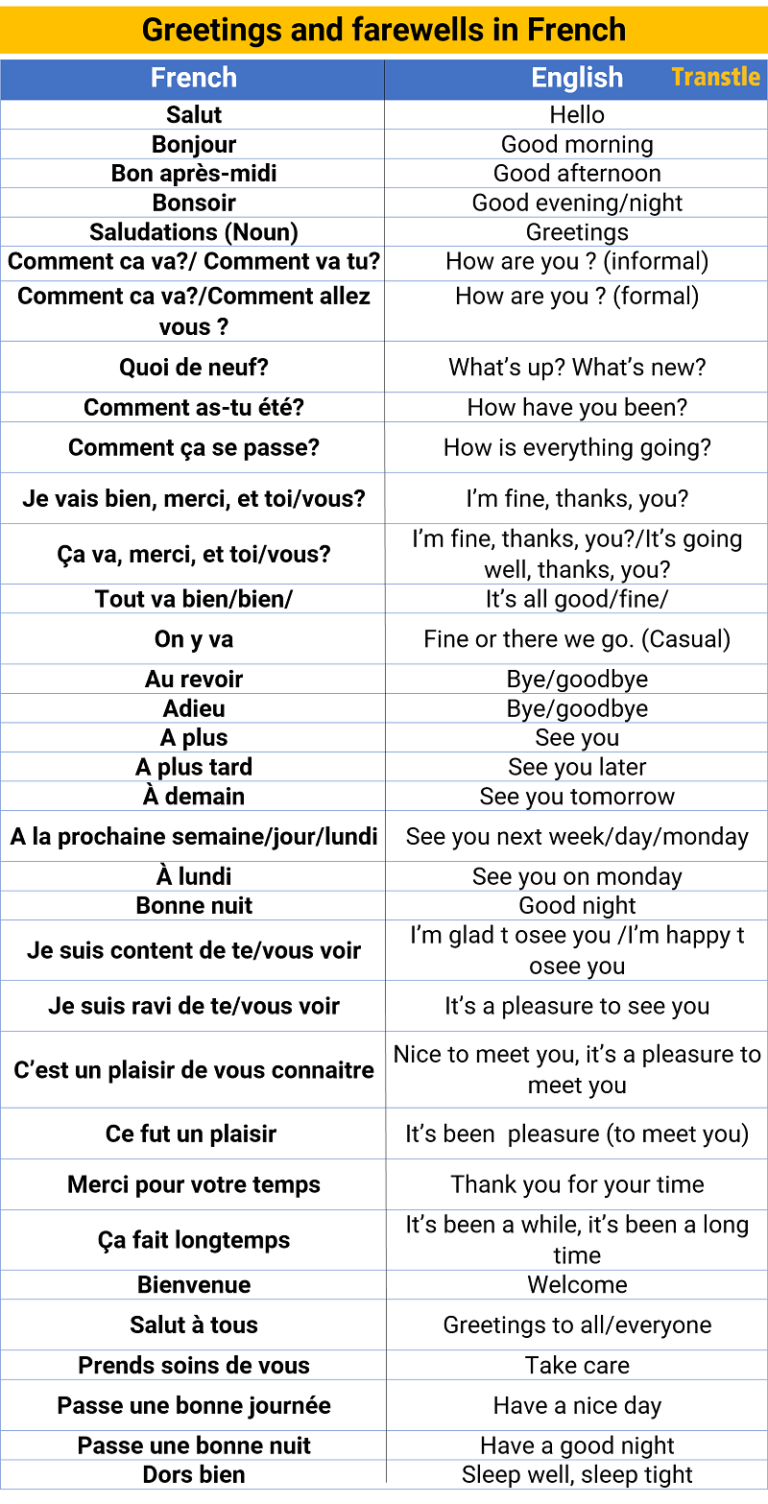
1. Basic French Greetings: Saying “Hello”
There are several ways to say “hello” in French, ranging from highly formal to very casual. Choosing the right one depends entirely on your relationship with the person and the context.
| French Expression | English Translation | Formality Level & Usage |
|---|---|---|
| Bonjour | Good day / Hello | Most common and versatile. Use anytime from morning until early evening. Always safe for formal situations. |
| Salut | Hi / Bye | Informal. Use only with friends, family, and peers. Can be used for both "hi" and "bye." |
| Bon après-midi | Good afternoon | Used specifically in the afternoon. Can be formal or informal, depending on context and tone. |
| Bonsoir | Good evening / Good night | Use from late afternoon/early evening onwards. Can be formal or informal. |
| Salutations | Greetings (Noun) | Formal or often used in written communication or when addressing a group. Less common in spoken everyday greetings. |
2. Asking “How Are You?” in French
Once you’ve said hello, inquiring about someone’s well-being is a common next step. The choice of phrase depends on your relationship (refer to our Tu and Vous guide for detailed use of these pronouns).
| French Phrase | English Translation | Formality Level & Usage |
|---|---|---|
| Comment ça va ? | How are you? | Versatile. Can be used in both informal and formal contexts. |
| Comment vas-tu ? | How are you? | Informal. Used with “tu” (friends, family, children). |
| Comment allez-vous ? | How are you? | Formal (with “vous”) or when addressing multiple people (even informally). Learn more about asking 'How are you?' |
| Quoi de neuf ? | What’s up? | Informal. A casual way to ask "What's new?" |
| Comment as-tu été ? | How have you been? | Informal. More specific to "How have you been *lately*." |
| Comment ça se passe ? | How is it going? | Informal. Asks about a general situation or project. |
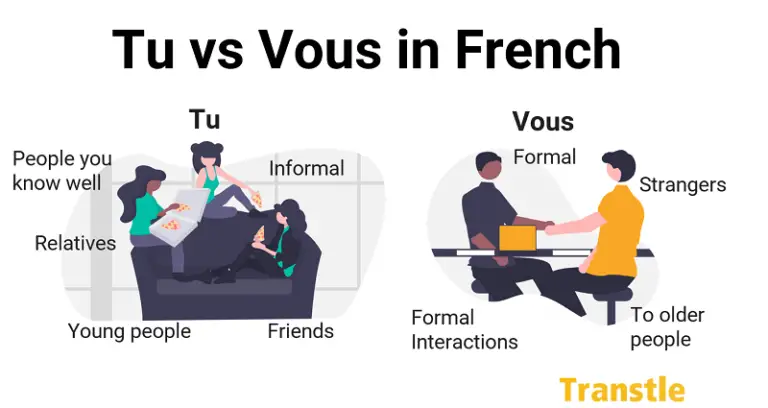
3. Responding to “How Are You?”
Here are common ways to respond when someone asks about your well-being:
| French Phrase | English Translation | Nuance & Formality |
|---|---|---|
| Je vais bien, merci, et toi/vous ? | I’m fine, thanks, and you? | Standard polite response. Use toi for informal, vous for formal/plural. |
| Ça va, merci, et toi/vous ? | I’m fine, thanks, and you? / It's going well, thanks, and you? | Common, slightly more casual. Use toi for informal, vous for formal/plural. |
| Tout va bien ! | Everything is going well! | Positive and slightly more emphatic. |
| Bien ! | Fine! / Well! | Simple and direct. Can be used in most contexts. |
| Super ! / Très bien ! | Great! / Very well! | Very positive and enthusiastic. |
| Pas mal. | Not bad. | Casual and common. |
| Pas trop mal. | Not too bad. | Casual, slightly better than pas mal. |
| Comme ci, comme ça. | So-so. | Indicates a neutral state, neither good nor bad. |
| Ça ne va pas. | It's not going well. / I'm not doing well. | Indicates negative well-being. |
| Mal. | Bad. | Direct and concise negative response. |
| Je suis fatigué(e). | I am tired. | Specific response indicating tiredness. (Add 'e' for female speakers). |
| Je suis malade. | I am sick. | Indicates illness. |
| Je suis stressé(e). | I am stressed. | Indicates stress. |
| Ça pourrait être pire. | It could be worse. | Humorous or resigned, indicating a less than ideal but not terrible situation. |
| Je ne me plains pas. | I can't complain. | Informal and positive; indicates satisfaction. |
4. Farewells
Just as there are many ways to say hello, there are various expressions for saying goodbye in French, each with its own nuance of formality or duration. It’s also a good idea to know the days of the week in French as they often appear in farewells!
| French | English |
| Au revoir | Bye/goodbye |
| Adieu | Bye/goodbye |
| A plus | See you |
| A plus tard | See you later |
| À demain | See you tomorrow |
| A la prochaine semaine/jour/lundi | See you next week/day/monday |
| À lundi | See you on monday |
| Bonne nuit | Good night |
Introductions and other common expressions
| French | English |
| Je suis content de te/vous voir | I’m glad t osee you /I’m happy t osee you |
| Je suis ravi de te/vous voir | It’s a pleasure to see you |
| C’est un plaisir de vous connaitre | Nice to meet you, it’s a pleasure to meet you |
| Ce fut un plaisir | It’s been pleasure (to meet you) |
| Merci pour votre temps | Thank you for your time |
| Ça fait longtemps | It’s been a while, it’s been a long time |
| Bienvenue | Welcome |
| Salut à tous | Greetings to all/everyone |
| Prends soins de vous | Take care |
| Passe une bonne journée | Have a nice day |
| Passe une bonne nuit | Have a good night |
| Dors bien | Sleep well, sleep tight |
Dialogue with greetings, introductions, and farewells in French
Dialogue 1. (Informal & Introduction)
Mathew: Bonjour Camille !
Camille: Salut Mathew !
Mathew: Comment ça va ?
Camille: Ça va bien, et toi ?
Mathew: Je vais bien, merci. Ça fait longtemps !
Camille: Oui, c’est vrai, quoi de neuf ?
Mathew: Je vis ici à Paris maintenant.
Camille: Bonne nouvelle ! Oh, Mathew, je te présente mon fiancé.
Mathew: Salut, enchanté.
Nicolas: Salut Mathew, je m’appelle Nicolas.
Mathew: Tu es espagnol ?
Nicolas: Oui, je viens d'Espagne. C’est ma première fois en France.
Mathew: Bienvenue alors !
Camille: Il adore la France.
Mathew: Oui, c’est un beau pays.
Camille: Quelle heure est-il ? Je crois que nous devons partir.
Mathew: D’accord, ça fait plaisir de te revoir Camille, et Nicolas, enchanté d'avoir fait votre connaissance. J'espère vous revoir bientôt.
Camille: Oui, moi aussi.
Nicolas: On peut aller dîner ce samedi.
Mathew: Oui, ça serait fantastique !
Camille: Parfait ! Je t'appellerai demain alors. À samedi.
Mathew: À plus. Bonne soirée.
Nicolas: Bonne soirée, prenez soin de vous.
Dialogue 2. (Formal)
Person 1: Bonjour. Je vais bien, merci. Est-ce que vous avez besoin d'aide ? (I'm doing well, thank you. Do you need any help?)
Person 2: Non, merci beaucoup. Au revoir ! (No, thank you very much. Goodbye!)
Person 1: Au revoir ! À bientôt ! (Goodbye! See you soon!)
In this conversation, Person 1 uses the formal greeting "Bonjour" and the formal pronoun "vous" to address Person
Read next
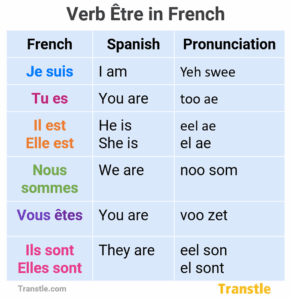
Verb Être in French: The Best Guide with Exercises
Master the French verb ‘être’ (to be)! Essential for basic sentences. Conjugation, uses, and examples, sentences and exercises.
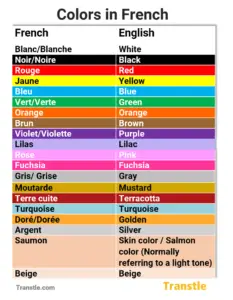
Colors in French: Complete List and Pronunciation
Learn colors in French! Complete list of colors in French with pictures, sentences, and pronunciation.
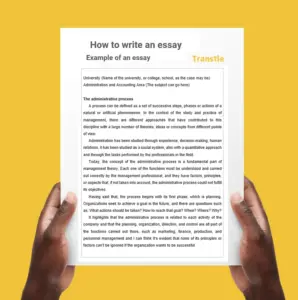
How to Write an Essay: Step by Step Guide & Examples
Essays are very useful and practical learning and expression tools. Learn how to write the introduction, body, conclusion of an essay & how to organize it.